The Influence of Egyptian Deities on Modern Spirituality
I. Introduction
Egyptian mythology is one of the most fascinating and enduring belief systems in human history. With its vast pantheon of gods and goddesses, rich symbolism, and intricate rituals, it has significantly influenced not only ancient civilizations but also modern spiritual practices. This article aims to explore the impact of Egyptian deities on contemporary spirituality, highlighting how these ancient figures continue to inspire and guide spiritual seekers today.
II. Historical Context of Egyptian Deities
To understand the influence of Egyptian deities on modern spirituality, it is essential to first examine their historical context. Ancient Egyptian religion is one of the oldest known belief systems, with roots stretching back thousands of years. Central to this religion was a complex pantheon of gods and goddesses, each with specific roles and attributes.
Key deities included:
- Ra: The sun god, symbolizing creation and life.
- Isis: The goddess of motherhood, magic, and fertility.
- Osiris: The god of the afterlife and resurrection.
- Anubis: The god associated with mummification and the afterlife.
- Horus: The sky god, often depicted as a falcon.
These deities played crucial roles in the daily lives of the ancient Egyptians, influencing everything from agriculture to governance and personal spirituality.
III. Rediscovery of Egyptian Spirituality
The 19th century witnessed a resurgence of interest in ancient Egyptian culture, often referred to as Egyptomania. This fascination with Egypt led to a revival of interest in its spirituality and deities. As artifacts were uncovered and translated, the symbols and beliefs of ancient Egypt began to captivate the Western world.
The modern interest in Egyptian spirituality has continued to grow, with many people seeking to reconnect with these ancient practices. This resurgence has spurred a variety of movements that incorporate Egyptian deities into contemporary spiritual frameworks.
IV. The Role of Egyptian Deities in Contemporary Spiritual Practices
Today, Egyptian deities are increasingly incorporated into modern witchcraft, paganism, and other spiritual practices. Many practitioners find resonance in the attributes and stories of these ancient figures, using them as archetypes for personal growth and spiritual exploration.
One notable movement is Kemeticism, a modern reconstructionist religion that seeks to revive ancient Egyptian religious practices. Followers often engage in rituals, prayers, and offerings to the gods, aiming to create a direct connection to the divine.
Key aspects of contemporary practices include:
- Rituals honoring specific deities, such as the celebration of festivals.
- Use of symbols and artifacts associated with Egyptian gods in spiritual work.
- Integration of ancient texts and wisdom into modern practices.
V. Symbolism and Archetypes of Egyptian Deities
The symbolism associated with Egyptian deities plays a significant role in their appeal to modern spiritual seekers. Each deity embodies specific archetypes, offering insights and guidance relevant to contemporary life.
For example:
- Isis: Represents healing, motherhood, and the power of magic.
- Osiris: Symbolizes transformation, resurrection, and the cycle of life.
- Anubis: Embodies protection in the afterlife and guidance through transitions.
These symbols resonate with individuals seeking meaning and direction in their spiritual journeys, allowing them to draw on the wisdom of ancient Egypt in their personal practices.
VI. Egyptian Deities in Popular Culture and Media
The influence of Egyptian mythology extends into popular culture, where these ancient deities are often represented in literature, film, and art. From blockbuster movies to bestselling novels, Egyptian gods and goddesses continue to capture the imagination of audiences worldwide.
Some notable examples include:
- The film series “The Mummy,” which brings ancient Egyptian themes to modern audiences.
- Books like “The Kane Chronicles” by Rick Riordan, which introduce young readers to Egyptian mythology.
- Artworks that explore the themes of death, resurrection, and the afterlife, drawing inspiration from Egyptian iconography.
These representations not only entertain but also contribute to a broader understanding of Egyptian spirituality and its relevance in contemporary spiritual narratives.
VII. Personal Experiences and Testimonials
Many individuals who engage with Egyptian deities in their spiritual journeys report transformative experiences. These accounts often highlight the profound impact of connecting with these ancient figures.
Common themes in testimonials include:
- A sense of protection and guidance felt through rituals and offerings.
- Experiences of personal transformation and healing attributed to the influence of specific deities.
- Enhanced understanding of one’s life purpose and spiritual path through the wisdom of ancient Egypt.
These personal stories illustrate how the ancient beliefs and practices of Egyptian spirituality continue to resonate with individuals seeking deeper connections in their lives.
VIII. Conclusion
The enduring legacy of Egyptian deities in modern spirituality is a testament to the timelessness of their wisdom and symbolism. As contemporary spiritual seekers look to the past for guidance and inspiration, the influence of these ancient figures remains strong.
In conclusion, the relevance of Egyptian beliefs in today’s spiritual landscape is evident. The stories, symbols, and archetypes of Egyptian deities offer profound insights that can aid individuals on their spiritual journeys, bridging the gap between ancient wisdom and modern practice.




